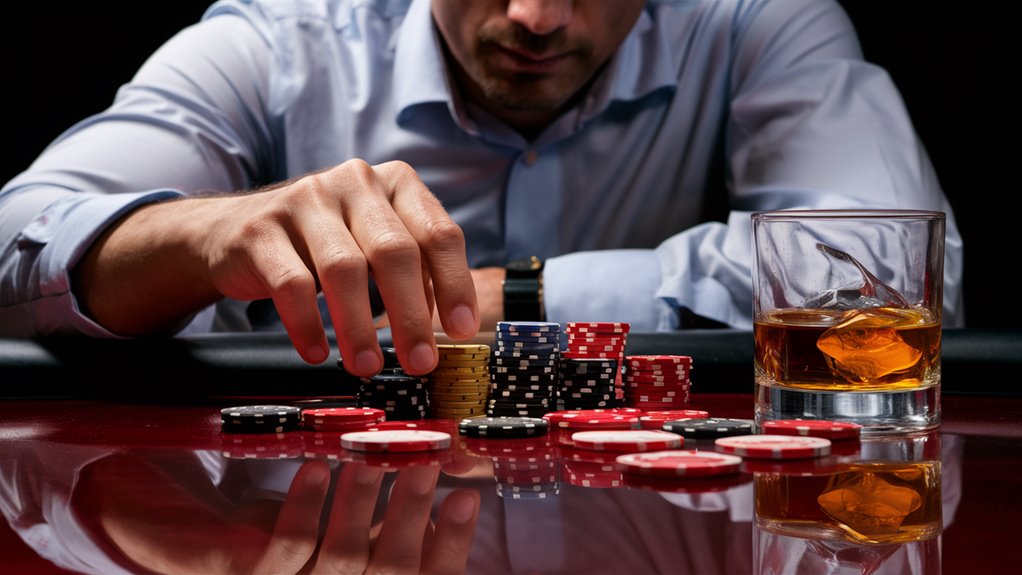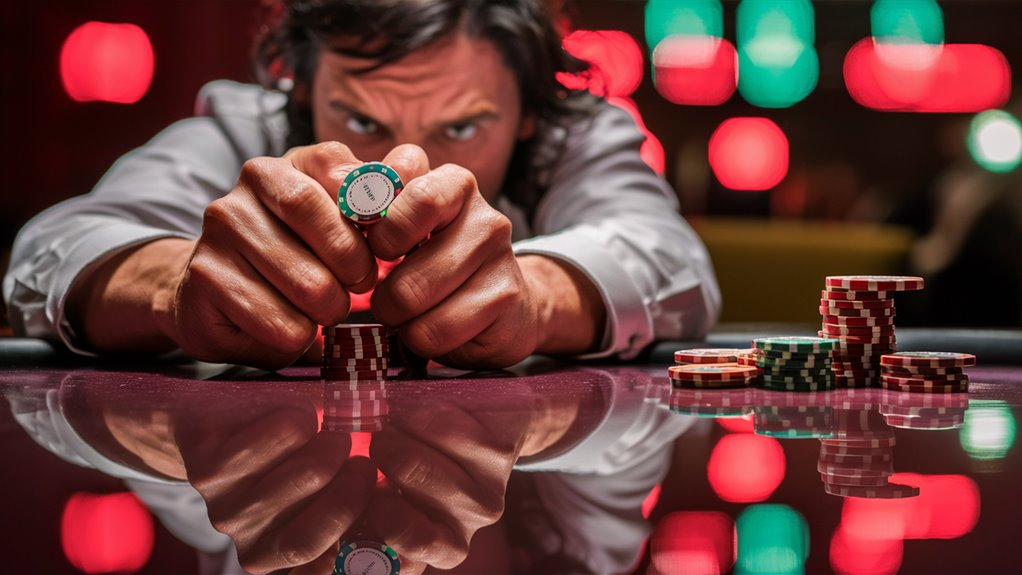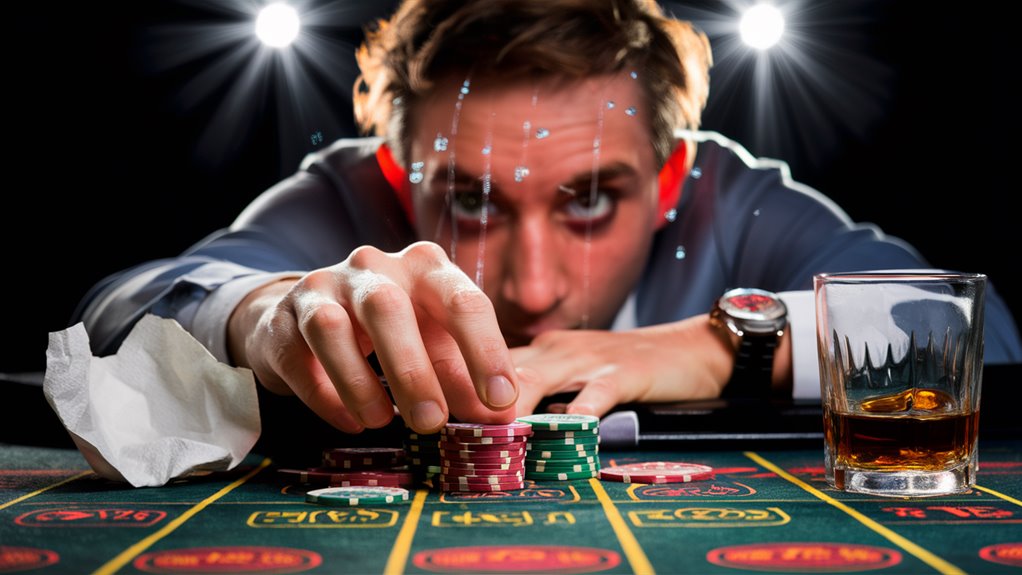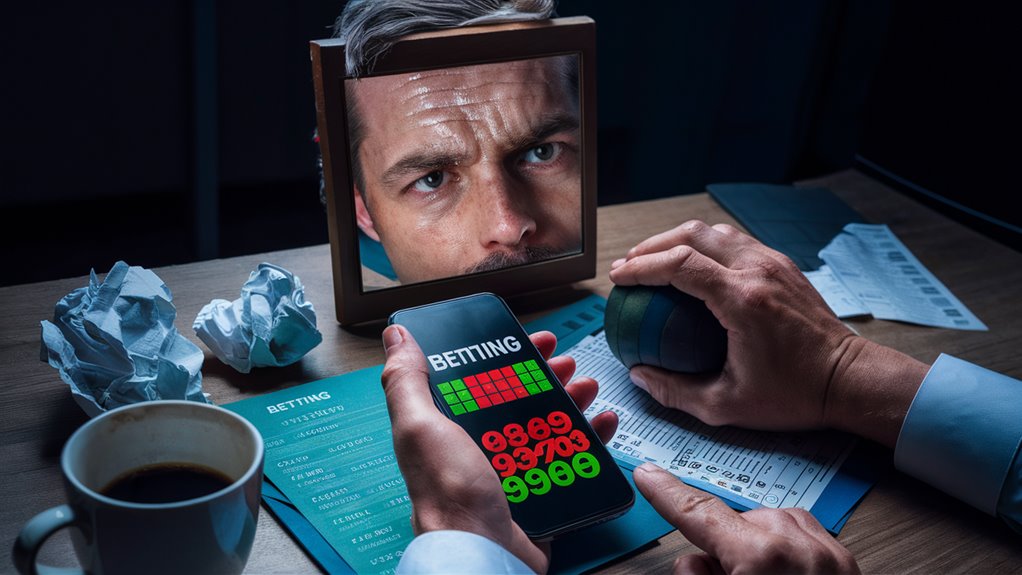
How Do Emotions Impact Real-Time Betting Decisions?
Key Takeaways
- Emotional triggers can override rational betting strategies in milliseconds
- Dopamine, fear, and anticipation directly influence betting behavior
- Understanding emotional patterns helps develop better risk management
The relationship between emotions and betting decisions operates through rapid neurological responses that can dramatically influence gambling behavior. When players engage in real-time betting, their brains process both rational calculations and powerful emotional impulses simultaneously.
The Science Behind Emotional Betting
Our nervous system responds to betting opportunities through three primary emotional triggers:
- Dopamine rushes during anticipation of wins
- Fear responses when facing losses
- Excitement spikes during close calls or near-misses
Real-Time Impact on Decision Making
Think of your betting mind like a car with two drivers – the logical navigator checking the map and the emotional driver ready to take sudden turns. During live betting situations:
- Rational strategies can get overridden within milliseconds
- Emotional impulses often lead to increased risk-taking
- Even experienced bettors face these psychological challenges
Managing Emotional Triggers
To maintain control over betting decisions:
- Recognize your emotional patterns
- Set strict betting limits before playing
- Take regular breaks during betting sessions
- Track decisions to identify emotional triggers
- Develop a structured betting strategy
Understanding these emotional mechanisms doesn’t just improve individual betting choices – it reveals fundamental patterns in human decision-making under pressure and uncertainty.
The Psychology Behind Impulsive Betting

Why Do People Bet Impulsively?
Key Takeaways
- Dopamine release triggers intense excitement during betting decisions
- The brain’s reward system can override rational thinking
- Setting betting limits helps control impulsive gambling behavior
The Science Behind Betting Impulses
When faced with a betting opportunity, the brain releases dopamine – a powerful neurotransmitter responsible for pleasure and reward-seeking behavior.
This neurochemical response creates an immediate rush of excitement and anticipation, often overwhelming logical decision-making processes.
How Emotions Impact Betting Decisions
The brain’s prefrontal cortex, which controls rational thinking, becomes less active during intense betting moments.
Meanwhile, the limbic system – our emotional center – takes over, leading to:
- Increased risk-taking when chasing losses
- Overconfidence in betting decisions
- Emotional betting during states of frustration or euphoria
Strategies to Control Impulsive Betting
- Set Predetermined Betting Limits
- Establish daily/weekly spending caps
- Stick to planned betting amounts
- Avoid changing limits during emotional states
- Implement Cooling-Off Periods
- Take scheduled breaks between bets
- Step away after wins or losses
- Allow time for rational thinking to resume
- Recognize Emotional Triggers
- Monitor your emotional state before betting
- Identify patterns in impulsive behavior
- Practice self-awareness during betting sessions
Understanding these psychological mechanisms helps develop healthier betting habits and maintain control over gambling behavior.
Regular self-assessment and strict adherence to betting limits serve as effective countermeasures against impulsive decisions.
Common Emotional Triggers While Gambling

What Emotional Triggers Impact Gambling Behavior?
Key Takeaways
- Fear of Missing Out (FOMO) often drives impulsive betting decisions
- Loss recovery attempts can create destructive gambling cycles
- Emotional states like excitement and overconfidence frequently lead to risky bets
- Understanding these triggers helps develop healthier gambling habits
The FOMO Effect
Fear of missing out represents one of gambling’s most powerful emotional triggers.
When players see others winning or hear success stories, it creates an urgent desire to participate and experience similar wins. This psychological pressure often leads to hasty betting decisions without proper risk assessment.
The Recovery Trap
Loss recovery compulsion creates a particularly dangerous cycle in gambling behavior.
Players experiencing losses frequently develop an overwhelming urge to continue betting until recovering their money. This “chase reflex” typically results in:
- Escalating bet sizes
- Increased frequency of wagers
- Deviation from planned betting strategies
- Greater financial losses
- Enhanced emotional distress
Arousal and Overconfidence
Heightened emotional states significantly impact betting behavior through:
- Pre-game excitement clouding strategic judgment
- Adrenaline rush affecting decision-making abilities
- Overconfidence after winning streaks
- Desperation during losing periods
- Impulsive increases in bet sizing
Each emotional trigger can lead to departure from rational betting strategies, highlighting the importance of emotional awareness in responsible gambling practices.
Fear and Loss Aversion

How Do Fear and Loss Aversion Impact Decision-Making?
Key Takeaways
- Fear triggers defensive decision-making patterns that limit rational choices
- Loss aversion makes people feel losses more intensely than equivalent gains
- Understanding these psychological triggers helps maintain strategic thinking
Understanding the Psychology of Fear in Decision-Making
Fear emerges as a powerful 카지노 디자인 미학 psychological force during high-stakes decisions, often paralyzing rational thinking processes.
When confronted with significant choices, the brain’s fear response can trigger a cascade of defensive reactions, leading to overly cautious or impulsive decisions.
The Impact of Loss Aversion on Behavior
Loss aversion manifests as the brain’s tendency to feel losses more intensely than equivalent gains.
This psychological principle frequently leads to:
- Making smaller decisions than optimal
- Missing profitable opportunities
- Taking excessive risks to recover losses
- Abandoning predetermined strategies
Managing Fear and Loss Aversion
To effectively handle these psychological triggers:
- Recognize emotional responses in real-time
- Step back from immediate decisions
- Practice conscious breathing
- Return to predetermined strategies
- Document decisions and outcomes
Practical Steps for Better Decision-Making
- Set clear decision-making criteria before emotional situations arise
- Establish firm limits and boundaries
- Create a structured review process
- Maintain detailed records of decisions and outcomes
- Practice emotional awareness techniques
This systematic approach helps maintain rational thinking even when confronted with fear-inducing situations or potential losses, enabling more strategic and successful outcomes.
Dopamine Rush During Winning Streaks

How Does Dopamine Influence Decision-Making During Winning Streaks?
Key Takeaways
- Dopamine releases during wins can override rational betting decisions
- Winning streaks alter risk perception and increase risk-taking behavior
- Chemical rewards create a false sense of skill and control
- Understanding dopamine’s effects is crucial for responsible gambling
The Science Behind Winning Streaks
When you experience a winning streak, your brain releases powerful bursts of dopamine that directly impact your decision-making abilities.
This neurochemical reward system creates an intoxicating cycle where each win strengthens your confidence and encourages increasingly larger bets.
During these moments, your brain’s reward circuitry doesn’t differentiate between calculated risks and dangerous gambles.
Impact on Risk Assessment
Dopamine doesn’t just create pleasant sensations – it actively reshapes how you evaluate risk. During winning streaks, you’ll likely notice:
- Taking bets you’d typically avoid
- Increasing stake sizes beyond comfort levels
- Overlooking clear warning signs
- Overestimating personal skill
- Underestimating random chance
The Illusion of Invincibility
The most critical effect of dopamine surges is the temporary sensation of invincibility they create.
This chemical influence can:
- Generate false beliefs about being “in the zone”
- Create illusions of having special insight or skill
- Override pre-set betting strategies
- Compromise bankroll management
- Lead to chase behaviors seeking continued highs
Understanding these neurological responses is essential because casinos rely on this exact biological mechanism to encourage continued play.
The dopamine rush from winning streaks can quickly overcome even the most carefully planned gambling strategies.
Social Pressure in Betting Decisions

How Does Social Pressure Influence Betting Decisions?
Key Takeaways:
- Social influences often override rational decision-making in betting
- Peer pressure intensifies through social media and group dynamics
- Cultural backgrounds shape personal betting behaviors
- Setting personal boundaries is crucial for responsible betting
Group Dynamics and Peer Pressure
Social pressure significantly impacts betting behavior, particularly in group settings during sports events.
When friends gather to watch games and place wagers, individuals often feel compelled to match bet amounts or take unnecessary risks to maintain social standing.
Social Media’s Impact on Betting Behavior
Digital platforms have amplified social pressure in betting through:
- Selective sharing of wins while losses remain hidden
- Creation of FOMO (Fear of Missing Out) through viral winning posts
- Increased exposure to betting-related content
- Social validation through likes and comments
Cultural and Family Influences
Environmental factors shape betting attitudes through:
- Early exposure to gambling activities
- Normalization of betting within family circles
- Community attitudes toward gambling
- Social reinforcement of betting behaviors
Setting Personal Boundaries
Maintaining healthy betting practices requires:
- Recognizing external pressure sources
- Establishing clear financial limits
- Making independent betting decisions
- Avoiding comparison with others’ betting patterns
- Understanding personal risk tolerance
The intersection of social dynamics and betting decisions creates complex behavioral patterns that require conscious awareness and active boundary-setting for responsible gambling practices.
Stress Impact on Betting Behavior

How Does Stress Affect Betting Behavior?
Key Takeaways
- Stress significantly impairs rational decision-making in betting situations
- High-stress levels lead to faster, more emotional betting choices
- External stressors increase vulnerability to risky betting patterns
Understanding the Stress-Betting Connection
Stress dramatically alters betting behavior by disrupting the brain’s decision-making processes.
During high-stress periods, the cognitive functions responsible for analytical thinking become compromised, often resulting in larger bets and loss-chasing behaviors.
The body’s fight-or-flight response triggers emotional rather than logical reactions to betting situations.
Three Critical Impacts of Stress on Betting
- Tunnel Vision Effect
- Reduces ability to see complete picture
- Makes important warning signs less noticeable
- Limits consideration of alternative options
- Accelerated Decision Making
- Reduces time spent analyzing odds
- Decreases probability assessment accuracy
- Leads to snap judgments without proper evaluation
- Emotional Amplification
- Intensifies reactions to wins and losses
- Creates stronger urges to recover losses
- Disrupts bankroll management strategies
External Stressors and Betting Risk
Financial pressures, relationship difficulties, and work-related stress create particularly vulnerable betting conditions.
These external factors compound decision-making impairment and increase the likelihood of poor betting choices.
Risk assessment abilities decrease significantly when dealing with multiple stressors simultaneously.
Risk Management Strategies
- Avoid placing bets during high-stress periods
- Implement a personal stress assessment before betting
- Create clear betting boundaries and limits
- Take regular breaks to evaluate emotional state
- Seek support when experiencing persistent stress
Managing Emotions While Betting

How Can You Control Your Emotions When Betting?
Key Takeaways:
- Set strict betting limits before starting
- Track emotions and decisions in a betting journal
- Take regular breaks to maintain mental clarity
- Practice mindfulness techniques for stress management
Understanding Emotional Control in Betting
Emotional management directly impacts betting success rates and financial outcomes.
When emotions override logic, bettors often make impulsive decisions that lead to significant losses.
Developing strong emotional control helps maintain consistent, profitable betting practices.
Setting Clear Betting Boundaries
- Establish maximum stake limits
- Define loss thresholds
- Create a strict betting schedule
- Stick to predetermined exit points
Implementing Emotion-Tracking Systems
Starting a detailed betting journal helps identify emotional triggers and decision patterns.
Record:
- Bet details and outcomes
- Emotional state before and after betting
- External factors affecting decisions
- Successful vs. unsuccessful betting patterns
Practical Stress Management Techniques
- Deep breathing exercises between bets
- Regular breaks after wins or losses
- Mindfulness practices during betting sessions
- Physical activity to release tension
Recovery Strategies After Losses
- Step away from betting platforms
- Review journal entries objectively
- Analyze decisions without emotional attachment
- Return only when mentally balanced
Remember: Emotional control isn’t about eliminating feelings entirely?�it’s about managing them effectively to make rational betting decisions.
Technology Tracking Emotional Responses

How Does Technology Track Our Emotional Responses While Using Digital Platforms?
Key Takeaways
- Advanced wearable devices monitor physiological responses in real-time
- Eye-tracking and facial recognition analyze user engagement patterns
- Machine learning creates detailed emotional profiles for personalized insights
- Mobile applications provide timely alerts for stress management
Understanding Physiological Markers
Modern wearable technology revolutionizes emotional response tracking through sophisticated biosensors.
These devices continuously monitor vital indicators like heart rate variability, skin conductance, and stress levels during digital interactions.
The collected data provides valuable real-time insights into users’ emotional states, helping identify patterns that influence decision-making processes.
Advanced Visual Analysis Tools
Eye-tracking software analyzes user attention patterns across digital interfaces, revealing how visual elements impact emotional responses.
When combined with facial recognition systems, the technology detects subtle micro-expressions indicating various emotional states:
- Anxiety levels
- Excitement peaks
- Moments of frustration
- Focus patterns
AI-Powered Emotional Profiling
Machine learning algorithms process comprehensive biometric data to develop detailed emotional profiles.
These profiles help:
- Identify behavior patterns
- Recognize potential stress triggers
- Track engagement levels
- Monitor emotional wellness
Mobile Integration and Real-Time Alerts
Smart applications now incorporate emotional tracking features that provide:
- Immediate stress level notifications
- Pattern recognition alerts
- Personalized wellness recommendations
- Behavior modification suggestions
Cultural Influences on Betting Patterns

How Do Cultural Beliefs Impact Betting Behaviors Worldwide?
Key Takeaways
- Cultural traditions directly influence gambling patterns and risk tolerance
- Collectivist vs. individualistic societies show distinct betting preferences
- Beliefs about luck and fate shape betting decisions across different cultures
Cultural Views on Gambling Across Societies
Betting behaviors vary dramatically between cultures, with some treating gambling as an integral part of celebrations while others view it as morally questionable.
These cultural perspectives create specific emotional triggers that drive betting decisions in different societies.
Group vs. Individual Betting Patterns
Collectivist societies typically embrace communal betting experiences, where shared emotions intensify both wins and losses. For example:
- Asian cultures: Number-based betting influenced by lucky/unlucky associations
- Western societies: Individual achievement focus leading to competitive, higher-risk bets
- Group dynamics: Emotional contagion affecting betting intensity
The Role of Fate and Destiny
Cultural beliefs about destiny significantly impact betting approaches:
- Fate-oriented cultures: More likely to follow superstitious betting patterns
- Self-determination focused societies: Tend toward analytical betting strategies
- Mixed approaches: Most cultures blend emotional and logical decision-making
Cultural Influence on Risk Assessment
Different societies evaluate betting risks through unique cultural lenses:
- Traditional societies: Often incorporate historical betting customs
- Modern cultures: Blend traditional beliefs with contemporary betting methods
- Hybrid approaches: Combine cultural wisdom with data-driven decisions
Understanding these cultural variations helps predict and analyze betting behaviors across different communities and markets.
Breaking Emotional Betting Cycles

How Can You Break Free from Emotional Betting Cycles?
Key Takeaways
- Identifying emotional triggers is crucial for controlling betting behavior
- Implementing cooling-off periods helps prevent impulsive decisions
- Setting firm limits and using automated restrictions creates protective barriers
- Tracking emotions through betting journals reveals vulnerable patterns
Breaking free from emotional betting cycles starts with recognizing the psychological triggers that drive impulsive gambling behavior.
Stress, anxiety, and the excitement of winning often lead bettors away from rational decision-making and carefully planned strategies.
Understanding Your Emotional Triggers
Maintaining a betting journal helps track both wagers and emotional states during betting activities.
This documentation reveals patterns of vulnerable moments and helps identify specific situations that trigger problematic betting behavior.
By analyzing these patterns, you can develop more effective preventive strategies.
Implementing Protective Measures
- Cooling-off periods
- Mandatory breaks between bets
- Extra time after significant wins or losses
- Objective evaluation of betting decisions
- Setting firm boundaries
- Pre-determined deposit limits
- Automated time restrictions
- Non-negotiable betting caps
Creating a Sustainable System
Success in breaking emotional betting cycles relies on establishing systematic safeguards rather than willpower alone.
Automated deposit limits and time restrictions serve as essential guardrails during emotionally charged moments.
This structured approach helps maintain rational decision-making and supports long-term responsible gambling behavior.
Remember: Breaking emotional betting cycles requires both self-awareness and practical systems working together to protect against trigger situations.
